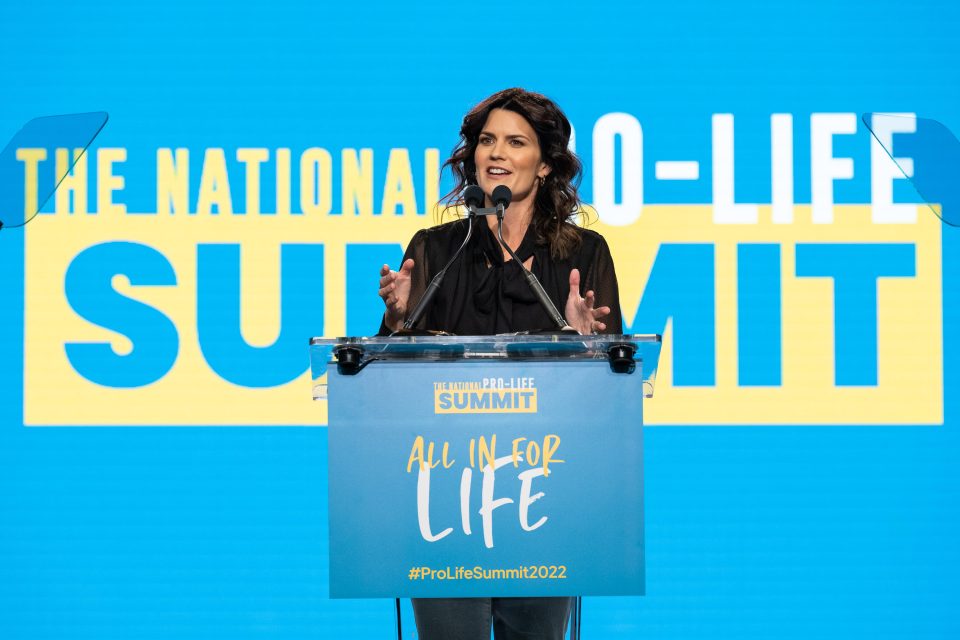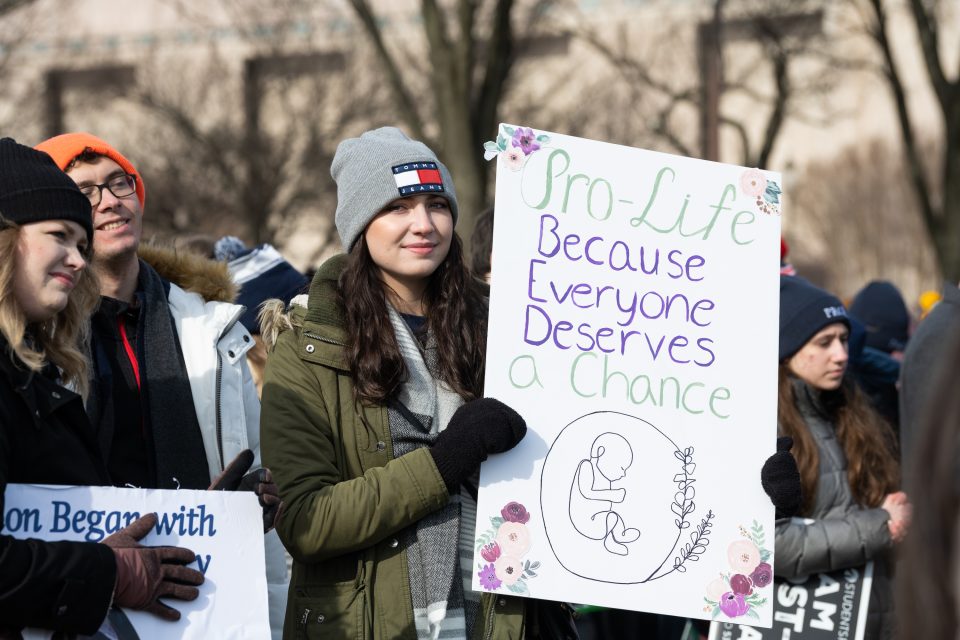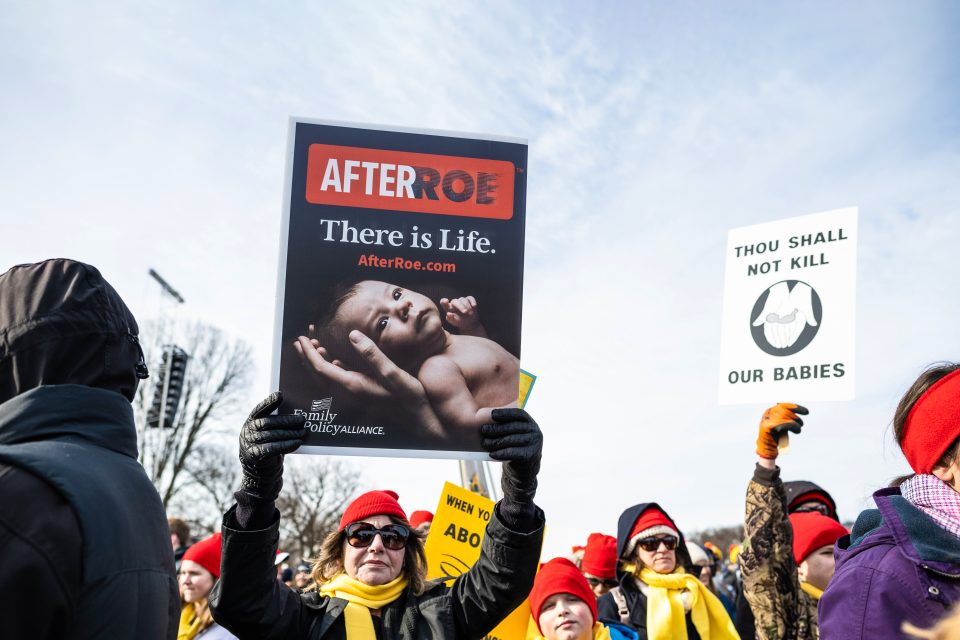Every January for the last 49 years, pro-life advocates—usually hundreds of thousands—have gathered in Washington, D.C., to participate in the world’s largest human rights demonstration—the March for Life. The event is held on the Friday closest to the anniversary of Roe v. Wade, the 1973 Supreme Court case that legalized abortion in the United States. Since then, more than 62 million American babies have died from legal abortion.
Regardless of the weather or the given cultural or political climate—even the COVID-19 pandemic—members of the pro-life movement have faithfully shown up and spoken out on behalf of the preborn. And this year’s March brought with it a legal backdrop: a Supreme Court case that could potentially overturn Roe v. Wade and return abortion law back to the states.
A Ruling on Roe
On Dec. 1, the Supreme Court heard oral arguments in Dobbs v. Jackson Women’s Health Organization, a case involving a Mississippi law that bans abortion at 15 weeks of pregnancy, with some exceptions. While the law itself is hotly contested, the state has also asked the high court to overturn Roe v. Wade as well as Planned Parenthood v. Casey (1992), where the court ruled that the Constitution protects the right to abortion before a preborn baby is viable.
With a court ruling expected in June, and the potential of Roe v. Wade being overturned or considerably weakened, the pro-life movement has gained momentum, some of its leaders believe.
“I feel like for the first time, probably in 49 years, the pro-life movement is actually on the offense instead of being on the defense,” said Abby Johnson, a former Planned Parenthood clinic director-turned-pro-life activist. “We finally have the upper hand.”
That the pro-life movement might finally be on the cusp of seeing Roe overturned has spurred many to march, especially students. These young pro-lifers weren’t shy about their beliefs at the March, proudly proclaiming the 2022 March for Life’s theme: “Equality Begins in the Womb.”
The Pro-Life Generation
Nineteen-year-old Lilah Hartman from Liberty University was one of about 400 students who came on buses from Lynchburg, Virginia, to Washington, D.C., to take a stand for life.
“I am so passionate about protecting the unborn,” she said. “Life is so valuable and so precious to God, and so it should be valuable and precious to us.”
Young people marching is not new. And one of the organizations reaching the younger generation is Students for Life of America (SFLA).
“This generation very much sees itself as a generation that is concerned about human rights,” said Kristan Hawkins, president of SFLA. “They want to speak out against injustice.”
“I think Roe v. Wade was the greatest injustice in our country since slavery, and there’s a great chance it’s going to be overturned,” said 19-year-old Mark D’Angelo from Tewksbury, New Jersey.

Like many Americans, Cissie Graham Lynch grew up thinking that Roe v. Wade was settled law. “I sat silent on the sidelines for so many years until I saw a generation rising up that was speaking in truth, and speaking in grace, and fighting for the most precious human right,” said Cissie, who offered the closing prayer at this year’s March.
A recently retired couple from Vancouver, Washington, said they were encouraged by the mass of young people marching alongside them.
“All these kids here weren’t even alive in 1973 when Roe v. Wade went to the Supreme Court,” said 74-year-old Donald Graham. “It’s just amazing that a whole other generation is here and is leading the country in this movement.”
Knowledge Is Power
As these young people are hopeful to be the first “Post-Roe Generation,” they aren’t naïve. They know that accurate information about abortion for many Americans—young and old—is scarce, leading to vast ignorance about its horrific realities and the tiny lives it claims.
“One of the reasons why abortion happens is because of a lack of education,” said 18-year-old Brock Hulsof, president of his high school’s Students for Life group. “I want to help change that and help people get educated.”
In that vein, Hulsof, along with 18-year-old Kristen Jansen, the vice president of the group, raised funds to fly members of their school’s pro-life club from Cape Girardeau, Missouri, to attend this year’s March.
“Standing for life is something that’s really important to us in everything that we do,” Jansen said. “The March for Life is so powerful, and we wanted to bring people to show them what it’s about and encourage them to keep standing up for life.”
As young people are finding their voice and uniting together to stand for life, they are often reminded of the generations prior who have been fighting for the preborn for decades.
Life Isn’t Limited to Party Lines
“Our country has lost our values,” said 81-year-old Harold Scott from Green Bay, Wisconsin. “We were built on Biblical values and built on God. [But] we’ve done a 180-degree turn. …We have taken God out of the United States of America. … What’s right is now wrong, and what’s wrong is now right.”

Reaching across the political aisle on the issue of abortion has become seemingly impossible in recent years. Oftentimes the pro-life movement is seen as a purely Republican or conservative cause, yet there is a small but passionate group of Democrats who are also pro-life, though their party rarely gives them a voice.
Dan Lipinski, former Illinois Democratic congressman, faithfully stood for life, but was pushed out of Congress by members of his own party.
“Politics and power, they’re secular and they are temporary,” Lipinski said. “But you know, my relationship with God, that’s permanent. And so, I always put that into perspective. I knew that the worst thing that could happen is that I could lose an election, but that pales in comparison to something much more serious, like denying my conscience and denying what I know is the truth, which is that life matters.”
Justice for the Preborn
For many in the pro-life movement, faith is a key component.
Former NFL tight end Benjamin Watson, who has become an outspoken advocate for life, said his faith informs him that God is a God of justice.
“Abortion is one of the issues that, I believe, grieves God’s heart,” said the father of seven, “and it’s why He talked so much about standing up for the vulnerable.”
Seeking justice for the preborn, especially in the African American community, is important to Watson due to the long legacy of racism in the abortion industry, especially from abortion giant Planned Parenthood and its roots in the eugenics movement.
The 2019 Centers for Disease Control and Prevention Abortion Surveillance report says that black preborn babies make up 38% of all abortions despite African Americans making up only 13% of the U.S. population. It’s a statistic that deeply concerns Watson and many others who feel like the abortion industry is targeting minority women.
As a last line of defense, Sidewalk Advocates for Life (SAFL) peacefully and prayerfully ministers to women who are just feet away from walking inside an abortion clinic.
“Prayer is the foundation of everything that we do,” said Lauren Muzyka, president and CEO of SAFL. “It is our strength and our shield, and it’s from that strength that we rise up to action. We’re told that faith without works is dead (see James 2:17). And faith is a pregnant word. It moves us to action. …
“There’s always a reason or a set of reasons that bring people to an abortion facility. So we need to remind people first how much God cares about them and how much we care about them, and then they’re usually more open to hearing about the life growing inside of them.”
Those who are praying and standing outside abortion clinics have also been catalysts in helping shut them down, with the help of organizations like Reprotection, which is led by Missy Martinez-Stone.
“The abortion industry doesn’t want to be regulated in any way—they don’t want a basic standard of health care,” Martinez-Stone said.
Pro-life leaders like Martinez-Stone, Johnson, Hawkins and others note that everyone can play a role in the pro-life movement, whether that’s leading a church prayer group to end abortion or arguing in front of the Supreme Court. The pro-life movement needs every available hand to reach out to others in the Name of Jesus Christ.
Are You Available?
Counting the 62 million babies who have died from abortion since 1973, and accounting for the children and grandchildren they might have had, some have estimated there are 200 million Americans who aren’t alive today because of abortion.

There are three steps to take to change this trend, said Stephanie Gray Connors, a pro-life activist and international speaker and debater. “The first is prayer, the second is study and the third is action.”
Pro-lifers are hoping that these three long-practiced steps will culminate in a Supreme Court victory in June.
“But we know the hard work won’t stop there,” said Cissie Graham Lynch. “It’s not about making abortion illegal in this country and advocating in our states, but really making it unthinkable in the hearts of our nation.”
And that starts by reaching out to vulnerable abortion-minded women with the hope of the Gospel.
“It’s God’s kindness that leads people to repentance,” said Amy Ford, co-founder and president of Embrace Grace, a nonprofit that exists to equip the church to show love to single and pregnant women. “It’s ultimately about loving and supporting women.”
God just wants His people to be available, Cissie said. And in our availability, He can move, like He did with the Prophet Moses.
“In the Bible, Moses asked, ‘Who am I to go before Pharaoh?’” Cissie said. “Many of us may be asking, ‘Who are we to go before the Supreme Court? Who are we to go on our state steps and advocate for women and children?’
“It’s not what we can do, but what He can do through us. God told Moses, ‘I will be with you.’ And God will be with us. We just need to be available for Him to use.”
Photos: David K. Morrison/©2022 Samaritan's Purse
